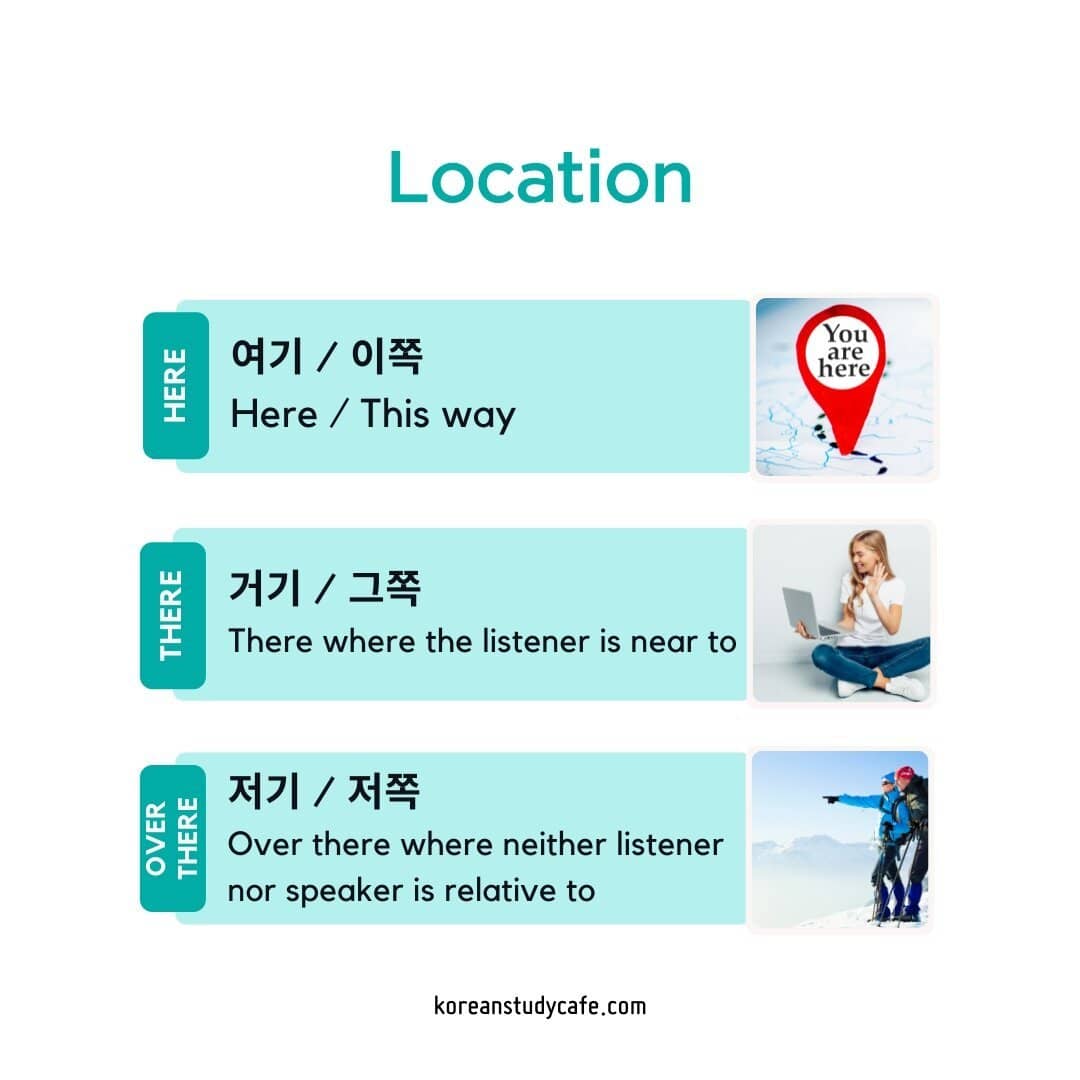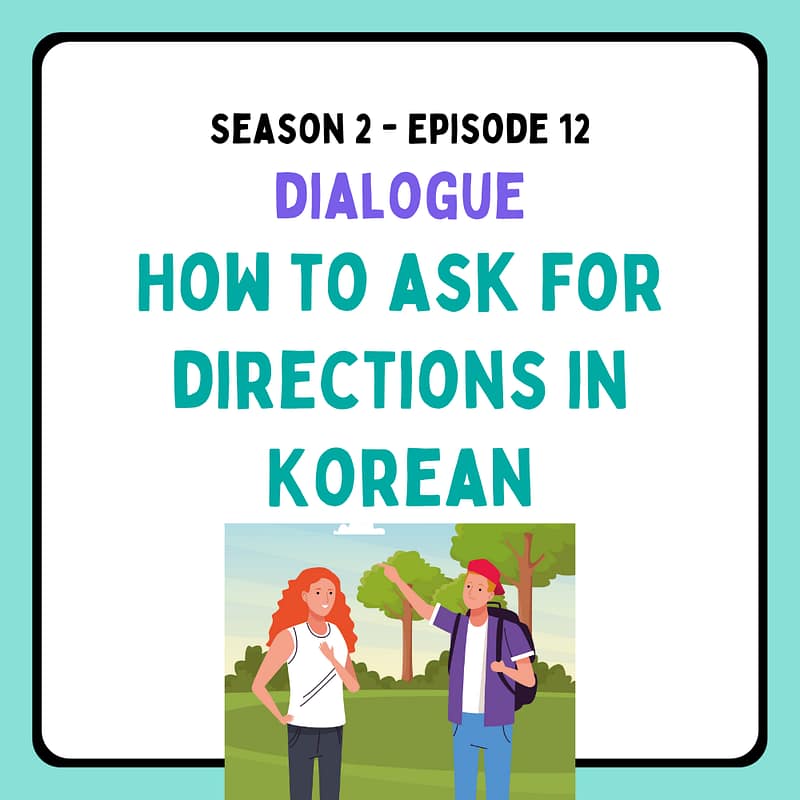Powered by RedCircle
시즌2, 12화. 대화편 | 한국어로 길 물어보기
Season 2, Episode 12 – Dialogue | How to ask for directions in Korean
C: 안녕하세요? 죄송한데 말씀 좀 물어볼게요.
Hello? Excuse me. I’m sorry but let me ask you something.
V: 네, 그러세요.
Yes, sure, go ahead.
C: 여기에서 경복궁까지 어떻게 가요?
How do I get to Gyeongbokgung from here?
V: 여기 근처 지하철역에서 2호선을 타고 교대에서 내리세요. 그리고 거기에서 3호선으로 환승해야 돼요. 그 후 14정거장을 지나면 경복궁역이에요. 아마 30분 정도 걸릴 거예요.
From the nearest subway station, take line 2 and get off at Gyodae Station. And from there, you have to transfer to line 3. After that, after 14 stops, it is Gyeongbokgung Station. It will probably take about 30 minutes.
C: 아 그렇군요. 감사합니다. 그런데 혹시 이 근처 지하철역은 어디에 있어요? 그리고 얼마나 걸려요?
Oh, right. Thank you. But where is the nearest subway station? And how long does it take?
V: 여기에서 지하철역은 아주 가까워요. 여기에서 지하철역까지 걸어서 5분 걸려요. 이 길 두번째 거리에서 왼쪽으로 도세요. 그럼 지하철역이 보일 거예요.
The subway station is very close from here. From here, it’s a 5-minute walk to the subway station. Turn left on the second street of this road. Then you will see the subway station.
C: 아, 정말 감사합니다.
Oh, thank you very much
V: 아니에요. 안녕히 가세요.
No worries. (You are welcome), Bye.
C: 네, 안녕히 가세요.
Yes, goodbye.
Okay, We heard a dialogue in Korean where one was asking the other how to get to his destination
In this dialogue, we can learn useful expressions to the actual situations. Then now, shall we break down the conversation together?
C: 안녕하세요? 죄송한데 말씀 좀 물어볼게요.
V: 네, 그러세요.
A guy opened the conversation with an expression “죄송한데 말씀 좀 물어볼게요..” “I’m sorry, I want to ask you something.”
If you listened to episode 20 of season 1, you would already know what this means. Yes, it means “Excuse me.” The expression 실례합니다 that you know as an equivalent expression meaning “Excuse me” is not commonly used in Korean conversation.
That’s because one of the Korean social cultures is where people don’t usually greet or have small talk with strangers. So when you need to talk to someone while you are on the street, you need to deliver the message saying that “I have no other intentions, just have a question for you.” Or you might be misunderstood as a strange person.
So when you need help from others while you visit Korea, try to use this expression.
Okay, then now let’s hear the next part.
C: 여기에서 경복궁까지 어떻게 가요?
V: 여기 근처 지하철역에서 2호선을 타고 교대에서 내리세요. 그리고 거기에서 3호선으로 환승해야 돼요. 그 후 14정거장을 지나면 경복궁역이에요. 아마 30분 정도 걸릴 거예요.
어떻게 가야 돼요? This is an expression of asking how to get your destination to the other person. The literal translation is “How do I go?”.
And the prepositions that I used in this part were 에서 from 까지 to. These two prepositions can help to deliver the meanings of words related to the place. So you can say so. 여기에서 경복궁역까지 from here to the Gyeongbok palace station. 서울에서 부산까지 from Seoul to Busan. 한국에서 미국까지 from Korea to the US.
So these two expressions are combined together in a sentence so 여기에서 경복궁역까지 어떻게 가요? How do I get to Gyeongbok palace station from here?
So the woman explained how to get there in detail. 여기 근처 지하철역에서 at the subway station near here, 2호선을 타고 take the line no. 2 and then, 교대역에서 내리세요 get off the subway at Gyodae station. 그리고 거기에서 and from there, 3호선으로 환승해야 돼요 you should transfer to line no. 3. 그 후 after that, 14정거장을 지나면 if you pass 14 stations, 경복궁역이에요 Its Gyongbok palace station. 아마 Maybe 30분 정도 about 30 minutes 걸릴 거예요 It will take that much of time.
You see? These expressions are beneficial to explain the direction in Korean. I will write all these expressions with infinitive verb forms on the website, so you should check them out.
Okay, then shall we listen to the last part?
C: 아 그렇군요. 감사합니다. 그런데 혹시 이 근처 지하철역은 어디에 있어요? 그리고 얼마나 걸려요?
V: 여기에서 지하철역은 아주 가까워요. 여기에서 지하철역까지 걸어서 5분 걸려요. 이 길 두번째 거리에서 왼쪽으로 도세요. 그럼 지하철역이 보일 거예요.
C: 아, 정말 감사합니다.
V: 아니에요. 안녕히 가세요.
C: 네, 안녕히 가세요.
Okay, we heard a different expression to ask directions in Korean. That was “이 근처 지하철역은 어디에 있어요?” Where is a subway station near here?
이 근처 and 여기 근처 mean the same. It’s “near here.” So you can use one of them in the actual conversation.
여기 means here, and 거기 means there where the listener is near to. And 저기 means there, but it’s where neither listener nor speaker is relative to.
If this is confusing a bit, go to our website and see the script or our Instagram. Then you will see a more detailed explanation about this part with images. That will help you to understand so much better.
Okay, and then the woman said 여기에서 지하철역은 아주 가까워요. It’s very close to the subway station from here. 걸어서 5분 걸려요. It takes 5 minutes on foot. 이 길 두번째 거리에서 at the second corner of this street 왼쪽으로 도세요 turn to the left side 그럼 then 지하철역이 보일 거예요 You will see the subway station(the subway station will be seen).
There are many useful expressions to explain the direction in Korean. This part will also be with infinitive verb forms on the website, so please check them out.
I’m pretty sure now you guys know how to ask for directions in Korean, so you will not be lost in Korea.
Expressions & Vocabularies

Here 여기 / There 거기 / Over there 저기
여기 means here
거기 means there where the listener is near to
저기 means there, but it’s where neither listener nor speaker is relative to.
서울에서 부산까지 from Seoul to Busan
어떻게 가요? How can I get to (destination)?
지하철역은 어디에 있어요? Where is the subway station?
이 근처 / 여기 근처 near here
그 근처 / 거기 근처 near there (where the listener is near to)
저 근처 / 저기 근처 near there (where neither listener nor speaker is relative to)
지하철을 타다 to take the subway
지하철에서 내리다 to get off the subway
3호선으로 환승하다 to transfer to the line No. 3
그 정거장을 지나면 if you pass that station
30분 정도(쯤) 걸리다 to take about 30 mins
지하철역이 가깝다 The subway station is close
지하철역이 멀다 The subway station is far
이 길 두번째 거리에서 at the second corner of this street
왼쪽으로 돌다 to turn to the left side
오른쪽으로 돌다 to turn to the right side




